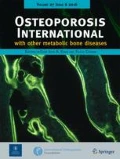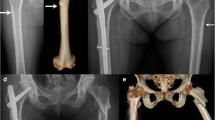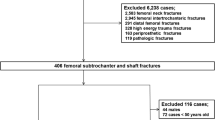Abstract
Summary
Recent evidence has linked long-term bisphosphonate use with insufficiency fractures of the femur in postmenopausal women. In this case–control study, we have identified a significant association between a unique fracture of the femoral shaft, a transverse fracture in an area of thickened cortices, and long-term bisphosphonate use. Further studies are warranted.
Introduction
Although clinical trials confirm the anti-fracture efficacy of bisphosphonates over 3–5 years, the long-term effects of bisphosphonate use on bone metabolism are unknown. Femoral insufficiency factures in patients on prolonged treatment have been reported.
Methods
We performed a retrospective case–control study of postmenopausal women who presented with low-energy femoral fractures from 2000 to 2007. Forty-one subtrochanteric and femoral shaft fracture cases were identified and matched by age, race, and body mass index to one intertrochanteric and femoral neck fracture each.
Results
Bisphosphonate use was observed in 15 of the 41 subtrochanteric/shaft cases, compared to nine of the 82 intertrochanteric/femoral neck controls (Mantel–Haenszel odds ratio (OR), 4.44 [95% confidence interval (CI) 1.77–11.35]; P = 0.002). A common X-ray pattern was identified in ten of the 15 subtrochanteric/shaft cases on a bisphosphonate. This X-ray pattern was highly associated with bisphosphonate use (OR, 15.33 [95% CI 3.06–76.90]; P < 0.001). Duration of bisphosphonate use was longer in subtrochanteric/shaft cases compared to both hip fracture controls groups (P = 0.001).
Conclusions
We found a significantly greater proportion of patients with subtrochanteric/shaft fractures to be on long-term bisphosphonates than intertrochanteric/femoral neck fractures. Bisphosphonate use was highly associated with a unique X-ray pattern. Further studies are warranted.



Similar content being viewed by others
References
Liberman UA, Weiss SR, Broll J, Minne HW, Quan H, Bell NH, Rodriguez-Portales J, Downs RW Jr, Dequeker J, Favus M (1995) Effect of oral alendronate on bone mineral density and the incidence of fractures in postmenopausal osteoporosis. The Alendronate Phase III Osteoporosis Treatment Study Group. N Engl J Med 333:1437–1443
Bone HG, Hosking D, Devogelaer JP, Tucci JR, Emkey RD, Tonino RP, Rodriguez-Portales JA, Downs RW, Gupta J, Santora AC, Liberman UA, Alendronate Phase III Osteoporosis Treatment Study Group (2004) Ten years’ experience with alendronate for osteoporosis in postmenopausal women. N Engl J Med 350:1189–1199
Black DM, Schwartz AV, Ensrud KE, Cauley JA, Levis S, Quandt SA, Satterfield S, Wallace RB, Bauer DC, Palermo L, Wehren LE, Lombardi A, Santora AC, Cummings SR, FLEX Research Group (2006) Effects of continuing or stopping alendronate after 5 years of treatment: the Fracture Intervention Trial Long-term Extension (FLEX): a randomized trial. JAMA 296:2927–2938
Odvina CV, Zerwekh JE, Rao DS, Maalouf N, Gottschalk FA, Pak CY (2005) Severely suppressed bone turnover: a potential complication of alendronate therapy. J Clin Endocrinol Metab 90:1294–1301
Goh SK, Yang KY, Koh JS, Wong MK, Chua SY, Chua DT, Howe TS (2007) Subtrochanteric insufficiency fractures in patients on alendronate therapy: a caution. J Bone Joint Surg Br 89:349–353
Kwek EB, Goh SK, Koh JS, Png MA, Howe TS (2008) An emerging pattern of subtrochanteric stress fractures: a long-term complication of alendronate therapy? Injury 39:224–231
Visekruna M, Wilson D, McKiernan FE (2008) Severely suppressed bone turnover and atypical skeletal fragility. J Clin Endocrinol Metab 93:2948–2952
Neviaser AS, Lenart BA, Lane JM, Lorich DG (2007) Nontraumatic femoral shaft fractures associated with alendronate use. Orthopedic Trauma Association Annual Meeting, Boston, MA.
Neviaser AS, Lane JM, Lenart BA, Edobor-Osula F, Lorich DG (2008) Low-energy femoral shaft fractures associated with alendronate use. J Orthop Trauma 22:346–350
Lenart BA, Lorich DG, Lane JM (2008) Atypical fractures of the femoral diaphysis in postmenopausal women taking alendronate. N Engl J Med 358:1304–1306
Garnero P, Shih WJ, Gineyts E, Karpf DB, Delmas PD (1994) Comparison of new biochemical markers of bone turnover in late postmenopausal osteoporotic women in response to alendronate treatment. J Clin Endocrinol Metab 79:1693–1700
Hughes DE, Wright KR, Uy HL, Sasaki A, Yoneda T, Roodman GD, Mundy GR, Boyce BF (1995) Bisphosphonates promote apoptosis in murine osteoclasts in vitro and in vivo. J Bone Miner Res 10:1478–1487
Kavanagh KL, Guo K, Dunford JE, Wu X, Knapp S, Ebetino FH, Rogers MJ, Russell RG, Oppermann U (2006) The molecular mechanism of nitrogen-containing bisphosphonates as antiosteoporosis drugs. Proc Natl Acad Sci U S A 103:7829–7834
Chavassieux P, Seeman E, Delmas PD (2007) Insights into material and structural basis of bone fragility from diseases associated with fractures: how determinants of the biomechanical properties of bone are compromised by disease. Endocr Rev 28:151–164
Boivin GY, Chavassieux PM, Santora AC, Yates J, Meunier PJ (2000) Alendronate increases bone strength by increasing the mean degree of mineralization of bone tissue in osteoporotic women. Bone 27:687–694
Currey JD (1984) Effects of differences in mineralization on the mechanical properties of bone. Philos Trans R Soc Lond B Biol Sci 304:509–518
Mashiba T, Turner CH, Hirano T, Forwood MR, Johnston CC, Burr DB (2001) Effects of suppressed bone turnover by bisphosphonates on microdamage accumulation and biomechanical properties in clinically relevant skeletal sites in beagles. Bone 28:524–531
Mashiba T, Hirano T, Turner CH, Forwood MR, Johnston CC, Burr DB (2000) Suppressed bone turnover by bisphosphonates increases microdamage accumulation and reduces some biomechanical properties in dog rib. J Bone Miner Res 15:613–620
Li J, Mashiba T, Burr DB (2001) Bisphosphonate treatment suppresses not only stochastic remodeling but also the targeted repair of microdamage. Calcif Tissue Int 69:281–286
Komatsubara S, Mori S, Mashiba T, Li J, Nonaka K, Kaji Y, Akiyama T, Miyamoto K, Cao Y, Kawanishi J, Norimatsu H (2004) Suppressed bone turnover by long-term bisphosphonate treatment accumulates microdamage but maintains intrinsic material properties in cortical bone of dog rib. J Bone Miner Res 19:999–1005
Burr DB, Turner CH, Naick P, Forwood MR, Ambrosius W, Hasan MS, Pidaparti R (1998) Does microdamage accumulation affect the mechanical properties of bone? J Biomech 31:337–345
Danova NA, Colopy SA, Radtke CL, Kalscheur VL, Markel MD, Vanderby R, McCabe RP, Escarcega AJ, Muir P (2003) Degradation of bone structural properties by accumulation and coalescence of microcracks. Bone 33:197–205
Diab T, Vashishth D (2005) Effects of damage morphology on cortical bone fragility. Bone 37:96–102
Schaffler MB, Choi K, Milgrom C (1995) Aging and matrix microdamage accumulation in human compact bone. Bone 17:521–525
Wenzel TE, Schaffler MB, Fyhrie DP (1996) In vivo trabecular microcracks in human vertebral bone. Bone 19:89–95
Allen MR, Gineyts E, Leeming DJ, Burr DB, Delmas PD (2008) Bisphosphonates alter trabecular bone collagen cross-linking and isomerization in beagle dog vertebra. Osteoporos Int 19:329–337
Ruppel ME, Miller LM, Burr DB (2008) The effect of the microscopic and nanoscale structure on bone fragility. Osteoporos Int 19:1251–1265
Siegmund T, Allen MR, Burr DB (2008) Failure of mineralized collagen fibrils: modeling the role of collagen cross-linking. J Biomech 41:1427–1435
Schatzker J, Tile M (eds) (1995) The rationale of operative fracture care. Springer, London.
Gehlbach SH, Avrunin JS, Puleo E, Spaeth R (2007) Fracture risk and antiresorptive medication use in older women in the USA. Osteoporos Int 18:805–810
Stafford RS, Drieling RL, Hersh AL (2004) National trends in osteoporosis visits and osteoporosis treatment, 1988–2003. Arch Intern Med 164:1525–1530
Salminen S, Pihlajamaki H, Avikainen V, Kyro A, Bostman O (1997) Specific features associated with femoral shaft fractures caused by low-energy trauma. J Trauma 43:117–122
Salminen ST, Pihlajamaki HK, Avikainen VJ, Bostman OM (2000) Population based epidemiologic and morphologic study of femoral shaft fractures. Clin Orthop Relat Res 372:241–249
Boivin G, Meunier PJ (2002) Changes in bone remodeling rate influence the degree of mineralization of bone. Connect Tissue Res 43:535–537
Eriksen EF, Melsen F, Sod E, Barton I, Chines A (2002) Effects of long-term risedronate on bone quality and bone turnover in women with postmenopausal osteoporosis. Bone 31:620–625
Roschger P, Rinnerthaler S, Yates J, Rodan GA, Fratzl P, Klaushofer K (2001) Alendronate increases degree and uniformity of mineralization in cancellous bone and decreases the porosity in cortical bone of osteoporotic women. Bone 29:185–191
Whyte MP, Wenkert D, Clements KL, McAlister WH, Mumm S (2003) Bisphosphonate-induced osteopetrosis. N Engl J Med 349:457–463
Rossini M, Gatti D, Zamberlan N, Braga V, Dorizzi R, Adami S (1994) Long-term effects of a treatment course with oral alendronate of postmenopausal osteoporosis. J Bone Miner Res 9:1833–7
Stock JL, Bell NH, Chesnut CH 3rd, Ensrud KE, Genant HK, Harris ST, McClung MR, Singer FR, Yood RA, Pryor-Tillotson S, Wei L, Santora AC 2nd (1997) Increments in bone mineral density of the lumbar spine and hip and suppression of bone turnover are maintained after discontinuation of alendronate in postmenopausal women. Am J Med 103:291–297
Burr DB (2002) Targeted and nontargeted remodeling. Bone 30:2–4
Plotkin LI, Weinstein RS, Parfitt AM, Roberson PK, Manolagas SC, Bellido T (1999) Prevention of osteocyte and osteoblast apoptosis by bisphosphonates and calcitonin. J Clin Invest 104:1363–74
Allen MR, Iwata K, Phipps R, Burr DB (2006) Alterations in canine vertebral bone turnover, microdamage accumulation, and biomechanical properties following 1-year treatment with clinical treatment doses of risedronate or alendronate. Bone 39:872–879
Lyles KW, Colon-Emeric CS, Magaziner JS, Adachi JD, Pieper CF, Mautalen C, Hyldstrup L, Recknor C, Nordsletten L, Moore KA, Lavecchia C, Zhang J, Mesenbrink P, Hodgson PK, Abrams K, Orloff JJ, Horowitz Z, Eriksen EF, Boonen S, HORIZON Recurrent Fracture Trial (2007) Zoledronic acid and clinical fractures and mortality after hip fracture. N Engl J Med 357:1799–1809
Acknowledgments
Rose Mary Fisher and the entire Metabolic Bone Disease Service at the Hospital for Special Surgery are acknowledged. Thanks are also due to Dr. Margaret Peterson for statistical expertise and Drs. Felicia Cosman and Richard S. Bockman for their critical review of the manuscript and expert advice.
Funding/support
This study was supported by The Charles Cohn Foundation, Inc. and NIH Grant R01-ARO41325 “FT-IR Microscopy of Mineral Structure in Osteoporosis.”
Conflicts of interest
Joseph M. Lane has been on speaker’s bureau for Eli Lilly, Proctor and Gamble, GlaxoSmithKline, and Roche Pharmaceuticals.
Author information
Authors and Affiliations
Corresponding author
Rights and permissions
About this article
Cite this article
Lenart, B.A., Neviaser, A.S., Lyman, S. et al. Association of low-energy femoral fractures with prolonged bisphosphonate use: a case control study. Osteoporos Int 20, 1353–1362 (2009). https://doi.org/10.1007/s00198-008-0805-x
Received:
Accepted:
Published:
Issue Date:
DOI: https://doi.org/10.1007/s00198-008-0805-x




